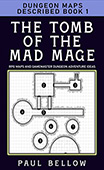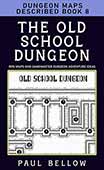At their core, both tabletop RPGs and poker are about telling a story—one turn, one hand, one decision at a time. Whether the setting is a candlelit tavern in a fantasy world or the neon-lit final table of a high-stakes tournament, the same dramatic beats keep players hooked: a careful build-up, escalating stakes, a pivotal twist, a big reveal, and a finale that lingers in memory.
You can see this in everything from the dice-fueled encounters of the 100 Graveyard Encounters for D&D 5e—zombies gambling over bones, skeletons with secrets—to the tension of a poker hand inching toward a showdown. In both games, every move can tip the narrative, and every risk carries the potential for glory or disaster.
Check out my *advanced* RPG AI Tools [GLOWING]
Below, we explore some of the ways that RPG sessions and poker games up the ante for added tension and engagement, with real-life examples that capture these in action:
- 1. The Slow Build-Up – From RPG Exploration to PokerStars’ MicroMillions
- 2. Escalating Stakes – High-Roller Drama in the Triton Poker Series
- 3. The Mid-Game Pivot – Chris Moneymaker’s 2003 Bluff That Changed Everything
- 4. The Dramatic Reveal – RPG Plot Twists and Americas Cardroom’s Mystery Bounty
- 5. The Climactic Showdown – Michael Mizrachi’s 2025 WSOP Main Event Victory
- 6. The Post-Game Debrief – From Table Talk to Twitch Poker Streams
- The Shared Language of Tension – Why RPGs and Poker Tell the Same Story
1. The Slow Build-Up – From RPG Exploration to PokerStars’ MicroMillions
In a good RPG, sessions open with atmosphere-building and subtle intrigue—characters explore, gather clues, or engage in everyday roleplay; the real drama simmers just beneath the surface.
Online poker builds tension the same way, especially in mass-entry, low buy-in series like PokerStars’ MicroMillions. With buy-ins starting as low as $1.10, thousands of players enter—but only a few will make the deep run. The early betting rounds are cautious; players observe behavior and build positional advantage, much like adventurers mapping the dungeon before the real threat arrives.
2. Escalating Stakes – High-Roller Drama in the Triton Poker Series
As an RPG session unfolds, threats grow and decisions start to carry greater consequences. A random street brawl might escalate into a plot-critical battle, and suddenly every move matters.
In poker, each betting round raises the stakes both financially and psychologically. The pot swells, and players must decide whether to commit more chips or back down. This escalation is magnified in real-world high-roller events like the Triton Poker Series—an invitation-only spectacle where buy-ins start at $15,000. Here, the stakes are sky-high from the outset, and every decision feels like it could make or break a career.
3. The Mid-Game Pivot – Chris Moneymaker’s 2003 Bluff That Changed Everything
The middle of an RPG session often features a twist—a hidden traitor revealed, a trap sprung, or a new objective that changes the party’s plan.
Poker has its own pivot point, and one of the most famous came at the 2003 WSOP Main Event. Chris Moneymaker, an amateur who had qualified online, faced poker pro Sam Farha heads-up. In a pivotal hand, Moneymaker pushed all-in with just king-high—a weaker holding—bluffing Farha off a better hand. That bold move flipped the momentum, leading to Moneymaker’s historic win and sparking the poker boom.
4. The Dramatic Reveal – RPG Plot Twists and Americas Cardroom’s Mystery Bounty
An RPG’s big reveal might be the appearance of the final boss, the unveiling of a villain’s plan, or the answer to a mystery that’s been hanging over the party for hours.
Online poker uses this same tension technique, which is especially evident in the leading poker site, Americas Cardroom. In particular, there is their Mystery Bounty game promotion, where knocking out an opponent earns you a sealed bounty prize. You don’t know whether it’s a modest payout or a massive jackpot until you open it. The moment of reveal mirrors the sudden, thrilling payoff of an RPG cliffhanger.
5. The Climactic Showdown – Michael Mizrachi’s 2025 WSOP Main Event Victory
The finale of an RPG session is often an epic confrontation where everything the party has built toward comes to a head. It’s tense, decisive, and satisfying—win or lose.
Poker’s equivalent is the final hand of a major tournament. A prime example came at the 2025 WSOP Main Event, where Michael “The Grinder” Mizrachi outlasted a field of over 9,000 players—the third-largest in WSOP history—to claim $10 million, his eighth gold bracelet, and induction into the Poker Hall of Fame.
6. The Post-Game Debrief – From Table Talk to Twitch Poker Streams
After the dice stop rolling or the last hand is dealt, players in both worlds love to relive the drama. RPG groups share war stories of critical hits and clever schemes, while poker players break down hands, recount bluffs, and debate strategy.
In the modern poker world, that debrief often happens publicly through Twitch poker livestreams. Even as Twitch has banned certain types of gambling content, poker remains fair game, allowing pros and enthusiasts to broadcast their sessions, analyze plays in real time, and interact with viewers. This streaming culture has transformed the debrief into a shared, interactive experience, where audiences tune in not just for the gameplay but for the storytelling, strategy, and personality-driven entertainment that follows the final hand.
The Shared Language of Tension – Why RPGs and Poker Tell the Same Story
From a dungeon crawl to a televised final table, the mechanics may differ, but the emotional arc is the same. Both games draw you in slowly, turn up the heat with rising stakes, throw in a twist that changes everything, deliver a reveal that makes your pulse race, and close with a showdown you’ll be talking about for years.
In RPGs, that story emerges from dice rolls, player decisions, and the Game Master’s narrative. In poker, it unfolds through bets, bluffs, and the drama of each card. Both invite you to inhabit a role—whether it’s a cunning rogue or a fearless chip leader—and challenge you to balance risk and reward in pursuit of victory.
And perhaps most importantly, both live on after the final move. The stories are retold, the pivotal moments debated, and the shared laughter and tension become part of the legend. Poker and RPGs are, at heart, two expressions of the same human drive: to compete, to create, and to tell unforgettable stories together.
Please visit Random Tables RPG for more like this.
Check out my *advanced* RPG AI Tools [GLOWING]





